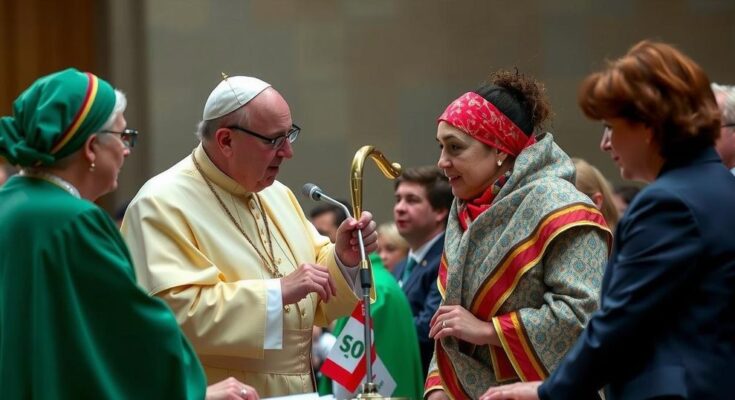A significant dispute has erupted at COP29 regarding the Vatican’s opposition to including references to gender in a climate action plan, aligning with several nations to obstruct support for women’s rights. This has raised alarm among charities and advocates, as the current framework addressing the disproportionate impact of climate change on women is at risk of expiration without an updated agreement.
The recent discussions at COP29, the UN climate summit, have been marred by controversy following the Vatican’s opposition to proposals supporting women’s rights in relation to climate change. Reports indicate that representatives from the Vatican have allied with nations such as Saudi Arabia, Russia, Iran, and Egypt to prevent any references to “gender” in the revised action plan, fearing inclusion of transgender individuals. This has significantly stalled efforts to improve support for women who are disproportionately affected by climate change, as highlighted by Colombia’s environment minister, Susana Muhamad, who criticized the obstruction as “unacceptable.” Charities have expressed alarm over the potential impact on women’s rights, as the current UN action framework is set to expire soon, leaving a gap in support mechanisms for vulnerable populations.
The backdrop of this issue is the acknowledgment over the past decade that women are disproportionately affected by climate change, often taking on caregiving roles during crises and facing significant obstacles in accessing reproductive health services. Current UN statistics reveal that women and girls may represent up to 80% of those displaced due to climate-related events. With only a minimal fraction of climate funding directed towards initiatives that consider women’s experiences, advocacy for gender-specific measures has become critical. The Lima Work Programme on Gender has been a ten-year initiative aiming to address these inequalities, but its future hangs in the balance due to conflicting views on the term “gender” among several countries at the current summit.
In conclusion, the stalling of critical discussions at COP29 regarding women’s rights highlights the ongoing conflict between traditional views and progressive gender rights advocacy within international climate negotiations. As countries diverge on the inclusion of gender and LGBTQ+ perspectives, the impending expiration of the UN action plan raises concerns about the future of targeted support for women affected by climate change. The urgency for prioritizing these issues is evident, particularly in light of the broader implications for human rights and gender equality globally.
Original Source: www.bbc.com




